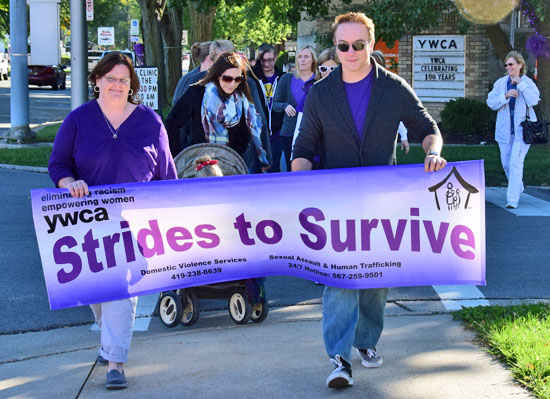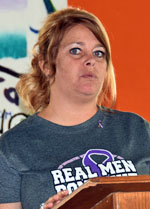YWCA domestic violence awareness walk
DAVE MOSIER/independent editor

The YWCA’s Strides for Survivors was meant to make local residents more aware of domestic violence and its consequences. Following a walk downtown to promote domestic violence awareness, those attending heard speaker April Maley, who could be the face of domestic violence and abuse, having lived through years of terror in her family, including the murder of her mother by her father.
Maley, who has a degree in addiction studies, with a minor in urban ministries, is now an admissions counselor who works with children from broken homes, something she can relate to, but she had to go through years of alcohol abuse and mental problems related to her childhood before she could function normally.
The author of I Will Not Be Silent talked about her parents and a home where abuse was the norm.
Her mother, Gracie Rose Morris, was a woman who had to take care of her four siblings from a young age while her own mother pursued an education. It was a situation from which she rebelled, running away several times before she became pregnant (with April) by a man seven years older than her.
That man, Dominic Morris, was a Vietnam War veteran whose experiences there may have triggered a least some of his reliance on alcohol and his abusive nature, although Maley seems to think her father was also abused as a child.
Maley said her earliest memories of her childhood, at age 3 or 4, was of her father beating her mother.
“I remember always being scared, but always trying to protect my mom,” she said, although she noted she was angry for a long time about the fact that her mother didn’t protect her and her siblings from their father’s anger and abuse.
Noting that she lost most her childhood because of the stress of living with an abusive father, Maley said that, for years after, she was angry because no one talked about the abuse in her family, which she came to feel was her fault.
“I felt worthless even when I was young,” she said. “I thought I had failed somehow.”
Living in that kind of a household was extremely stressful, Maley said, because of her father’s volatility.
“You didn’t want to make him mad, because you never knew what would become of it,” she noted.
That cycle of abuse culminated when she was 9, when her father shot and killed her mother and wounded her uncle when her mother, who had left the home, returned to get personal items from the house after finally deciding to leave her husband.
Maley said that, to this day, she remembers seeing her uncle come out of the house with blood coming from a chest wound, while she and her three siblings, who were ages 6, 2, and 1, watched from the car. April then ran from the car into the house, where she saw her mother’s face blown away from a shot fired by her father.

April herself could have been killed, after she angrily confronted her father, telling him she hated him. Her father then placed his gun on her forehead and said, “I hate you too.”
She then ran away, while still wondering today while he didn’t shoot her in the back as she ran.
While that was the last time she saw her father, Maley said it wasn’t the last of her problems, noting that she spent much of her adult life trying to come to some kind of understanding of her childhood and why someone did not speak out about the situation.
The silence that surrounded her family’s abusive situation, and the failure of other adults to intervene in the situation, allowed that abuse to continue until it resulted in the death of her mother, Maley feels.
She also blames her mom for remaining in the abusive household, noting that her mother had a choice, but she and her siblings, as innocent children, did not.
The feeling that what happened to her mother was somehow her fault, as well as feelings of worthlessness, followed Maley into her adulthood,
She said that, for many years, she felt: “I was not worth anything; why am I here?”
Following years of struggle, it was religion that finally helped her deal with those negative feelings, as well as understand what had happened to her.
“I do believe that it was God that brought me through it,” Maley said.
Noting that children should never have to go what she did as a child, Maley urged those attending to be aware of abusive situations and to speak out to those in authority when such situations occur.
POSTED: 10/10/16 at 6:55 am. FILED UNDER: News







